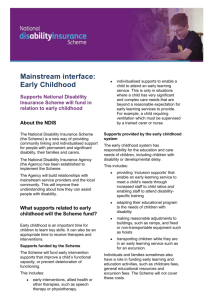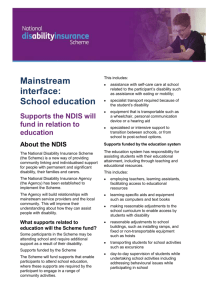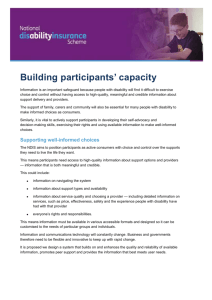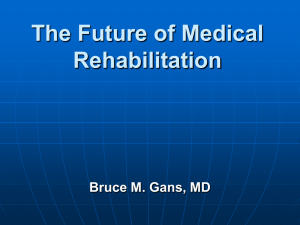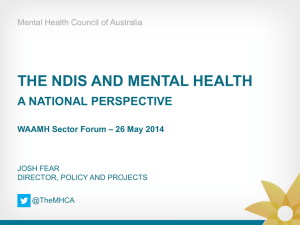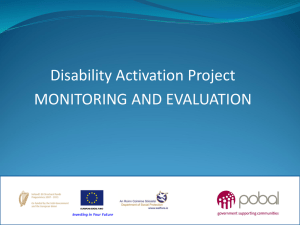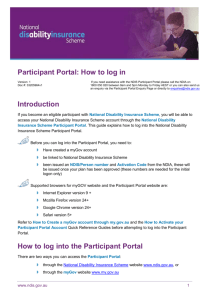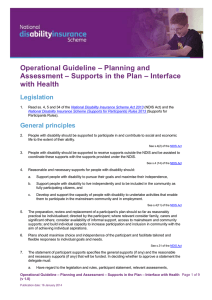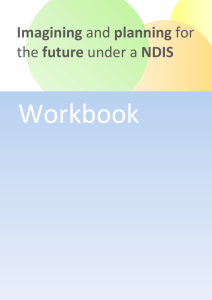Fact sheet: Supports the NDIS will fund in relation to healthcare
advertisement
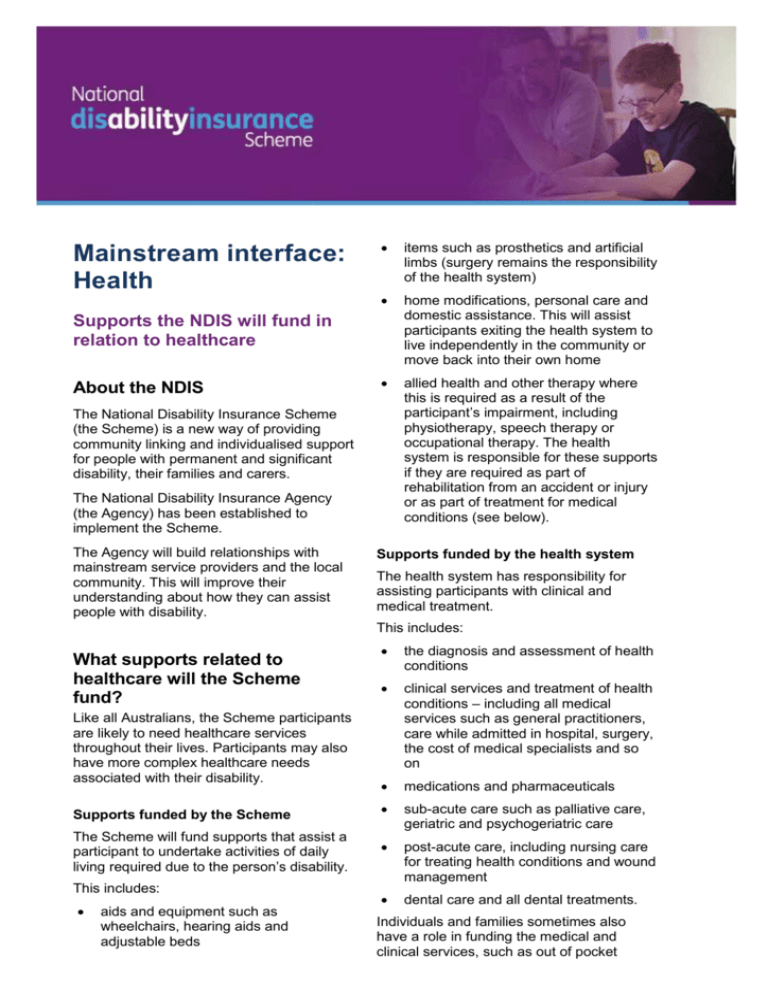
Mainstream interface: Health items such as prosthetics and artificial limbs (surgery remains the responsibility of the health system) home modifications, personal care and domestic assistance. This will assist participants exiting the health system to live independently in the community or move back into their own home allied health and other therapy where this is required as a result of the participant’s impairment, including physiotherapy, speech therapy or occupational therapy. The health system is responsible for these supports if they are required as part of rehabilitation from an accident or injury or as part of treatment for medical conditions (see below). Supports the NDIS will fund in relation to healthcare About the NDIS The National Disability Insurance Scheme (the Scheme) is a new way of providing community linking and individualised support for people with permanent and significant disability, their families and carers. The National Disability Insurance Agency (the Agency) has been established to implement the Scheme. The Agency will build relationships with mainstream service providers and the local community. This will improve their understanding about how they can assist people with disability. Supports funded by the health system The health system has responsibility for assisting participants with clinical and medical treatment. This includes: What supports related to healthcare will the Scheme fund? Like all Australians, the Scheme participants are likely to need healthcare services throughout their lives. Participants may also have more complex healthcare needs associated with their disability. Supports funded by the Scheme The Scheme will fund supports that assist a participant to undertake activities of daily living required due to the person’s disability. This includes: aids and equipment such as wheelchairs, hearing aids and adjustable beds the diagnosis and assessment of health conditions clinical services and treatment of health conditions – including all medical services such as general practitioners, care while admitted in hospital, surgery, the cost of medical specialists and so on medications and pharmaceuticals sub-acute care such as palliative care, geriatric and psychogeriatric care post-acute care, including nursing care for treating health conditions and wound management dental care and all dental treatments. Individuals and families sometimes also have a role in funding the medical and clinical services, such as out of pocket expenses, gap payments and private health insurance fees. The Scheme will not cover these costs. Which system assists with rehabilitation? The Scheme and the health system will work closely together where a person needs rehabilitation following an accident or injury. Where the initial rehabilitation is needed following injury, accident or other medical event, the support is the responsibility of the health system. This means that any surgery or treatment following an injury, accident or other medical event is not funded by the Scheme. The health system would provide supports that enable a person to regain their maximum achievable level of functioning. This could include, for example, care in a rehabilitation unit after a spinal cord injury. The Scheme assists the participant once the health system has provided these rehabilitation services. The supports offered by the Scheme may include: home modifications, aids and equipment personal care and domestic assistance to enable the participant to live independently in the community on-going allied health or other therapies to enable the participant to maintain their level of functioning. Which system assists with early intervention? The Scheme will fund early intervention treatments for participants which increase their functional capacity. This includes supports such as a speech therapy and occupational therapy. However, if the support is provided after a recent medical or surgical event, with the ndis.gov.au aim of improving the person’s functional status, this support is the responsibility of the health system. This includes rehabilitation or post-acute care. What happens if the health system doesn’t fund the supports I need? If the health system is responsible for a support, the Scheme cannot fund that support, even if the health system does not provide it. However, the Scheme may still be able to provide assistance to participants, for example, a Local Area Coordinator can assist the participant to make contact and discuss their needs with appropriate healthcare providers. What happens next? Participants and their families will discuss their goals with the Agency as part of their planning conversation. The participant’s plan will include the supports the Scheme will fund for participants and those supports which are the responsibility of the health system (where appropriate). More information Visit ndis.gov.au Email enquiries@ndis.gov.au Call 1800 800 110* Monday to Friday, 9.00am to 5.00pm EST. For people with hearing or speech loss: - TTY: 1800 555 677 - Speak and Listen: 1800 555 727 - For people who need help with English TIS: 131 450 *1800 calls are free from fixed lines; however calls from mobiles may be charged. 2
